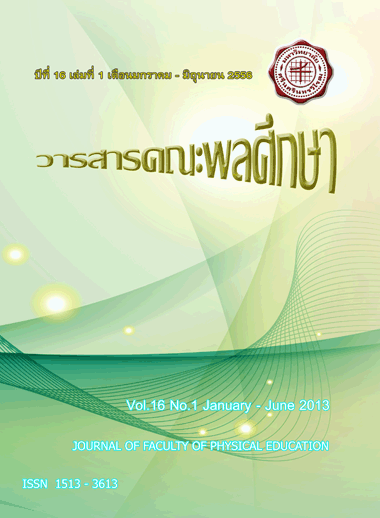ATTITUDE TOWARDS RECREATION ACTIVITIES PROGRAM PATICIPATION OF THE STUDENT IN MATHAYOM SUKSA III
Abstract
The purpose of this quasi-experimental research was to study and compare attitude towardsrecreation activities program of the student in Mathayomsuksa III. The samples were 60 students bothmale and female studying in Mathayomsuksa III at 2012 academic years in Wattakramean SchoolThamaka, Kanchanaburi. They were selected by Multi-stage Random Sampling. The subjects wereexamined by attitude towards recreation activities program participation test made by the researcher tomeasure the cognitive, affective and behavior. Then the subjects were divided into experimental groupand control group by using match group method .The experimental group was assigned to participate inthe specific group for 90 minutes, 2 times a week, for 8 weeks. Evaluation of the attitude towardsrecreation activities program participation test of all groups were measured after 8th week of theexperiment. The research instrument were () the recreation program for the student in MathayomsuksaIII and ( ) attitude towards recreation activities program participation test. The content validity of bothinstruments were approved by 5 experts. Both index of congruence was 0.80-1.00 and 0.60-1.00respectively. The coefficient of reliability by using Cronbach method of attitude towards recreation activitiesprogram participation test was 0.93. Data were then analyzed in term of means and standard , t-testDependent and t-test Independent to determine the results with significant difference at the level .05.The result were as follows :1. The effect of the attitude towards recreation activities program within the experimental group after8th week of the experiment. The attitude towards recreation activities program to over all were rather goodand each item was cognitive and behavior were rather good and affective was good.2. The comparison of the attitude towards recreation activities program within the experimentalgroup after participating in recreation program of the student in Mathayomsuksa III was higher than beforeparticipating in recreation program was significant difference at the .05 level.3. The comparison of the attitude towards recreation activities program between theexperimental group after participating in recreation program of the student in Mathayomsuksa III was higher than the control group was significant difference at the .05 level in 3 components were cognitive, affectiveand behavior.Downloads
Published
2013-11-07
Issue
Section
บทความวิจัย

